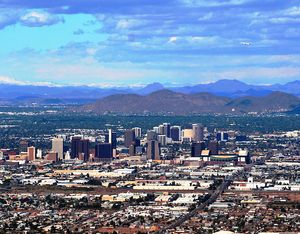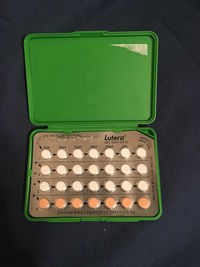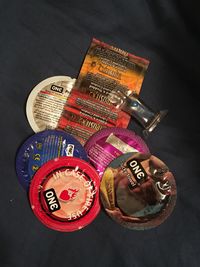Gynopedia needs your support! Please consider contributing content, translating a page, or making a donation today. With your support, we can sustain and expand the website. Gynopedia has no corporate sponsors or advertisers. Your support is crucial and deeply appreciated.
Phoenix
| Contraception: Over-the-Counter | condoms | ||||||
| Contraception: Prescription/Clinic Required | pills, patch, ring, IUD, implant, shot | ||||||
| Emergency Contraception | no prescription required; available in pharmacies | ||||||
| STIs | no travel restrictions; HIV-positive foreigners not deported | ||||||
| Menstrual Products | pads, tampons, cups | ||||||
| Abortion Law | law unclear; abortion unavailable | ||||||
| LGBTQ Laws | homosexuality legal; gender change legal | ||||||
| Related Pages | United States of America | ||||||
OVERVIEW
As the largest city in Arizona, you will find many health care resources in Phoenix. Like most other US cities, you'll need a prescription to obtain birth control (with the exception of condoms and a few other methods). You don't need a prescription to purchase emergency contraception (the morning after pill), and everyone, including minors, can purchase Plan B. Like other US cities, you can find the HPV vaccine. You can also find PrEP and PEP in Arizona, and we have provided more information on vendors below (in the "Medications and Vaccines" section).
The legal status of abortion in Arizona is currently unclear. In June 2022, the United States Supreme Court struck down Roe v. Wade, a ruling that formerly protected federal abortion rights.[1] This means that states can determine their own abortion laws. Within hours of the overturning of Roe v. Wade, state senate Republicans of Arizona released a statement, which said that abortion was banned in the state.[2] Planned Parenthood of Arizona announced that they would halt all abortion procedures in their 7 clinics in the state, since abortion laws were unclear.[3]
Contraception (Birth Control)
General Note: There are many types of contraceptives, also known as "birth control," including IUDs, oral contraceptives, patches, shots, and condoms, etc. If you would like to view a full list, click here.
Laws & Social Stigmas
In Arizona, you need a prescription to obtain most birth control. You don't need parental permission to get a birth control prescription. While you can go to many clinics, some people prefer to go to Title X clinics. These are clinics that are completely confidential, which means that your appointment and billing will be confidential. At Title X Clinics, teens and adults can receive sexual and reproductive health care. They charge on a sliding-scale basis. They may be able to give you a prescription to birth control pills, as well as condoms and sexual health counseling. If you pay for their services with family health insurance and you're a teenager, your parents may see that you visited the clinic in their bills. We provide a list of Title X clinics (as well as some low-cost clinics) below.
What to Get & Where to Get It
Here are some Title X clinics in Phoenix:
- North East Phoenix Health Center- Phoenix , AZ: Address: 3131 E. Thunderbird Rd., Suite 48, Phoenix, AZ 85032, p: 602.277.7526 | f: 602.953.8052.
- Arizona Family Health Partnership (Navajo): Address: 3101 N. Central Ave, Ste 1120, Phoenix, AZ 85012, (602) 258-5777.
Here are some clinics where you can get birth control:
- Women's Care Clinic: They provide low-cost and LGBT-friendly services, including birth control pills, implants and IUDs. They accept the uninsured and can do same-day insertion for IUDs. Address: 2525 E Roosevelt St, Phoenix, AZ, 850084948, (602) 344-5988
- Central Phoenix Health Center: This is a Planned Parenthood center, so it should be more affordable. They birth control pills, birth control implant, birth control patch, birth control shot, birth control vaginal ring (NuvaRing), condoms, IUDs (hormonal) and IUDs (copper). Address: 4751 N 15th Street, #3, Phoenix, AZ, 85014. (602) 277-7526.
- Camelback Family Medicine: We're not sure if they're low-cost, but they do provide birth control pills, implants and IUDs. They do same-day insertion for IUDs. Address: 4141 North 32nd Street, Phoenix, AZ, 85018, (602) 279-2337.
- Maricopa OB/GYN: They provide many birth control methods, including birth control pills, Vaginal Contraception – NuvaRing, Birth Control Patch – Ortho Evra, Progesterone Only Birth Control Methods, Depo Provera, Nexplanon, Oral Progesterone, Intrauterine Systems (Mirena and Paragard), and Permanent birth control (Essure and Tubal Ligation). They have 2 locations: 1661 E Camelback Road , Suite 160 and 4530 E. Ray Rd., Suite 125. Check out their website for details.
- abortion in arizona: Address: 1331 N. 7th Street Suite 225 Phoenix, AZ 85006, p: 602-553-0440 | p: 00-558-0440 | Email: support@fpamg.com .
Costs
Emergency Contraception (Morning After Pill)
Important Notes: Emergency contraception may prevent pregnancy for three days (72 hours) and sometimes five days (120 hours) after unprotected sex. Take EC as soon as possible after unprotected sex. If you don't have access to dedicated EC, oral contraceptives can be used as replacement EC, but remember the following: 1) Only some contraceptives work as EC 2) Different contraceptives require different dosages and time schedules to work as EC 3) You must only use the first 21 pills in 28-day packs and 4) They may be less effective than dedicated EC. For general information on emergency contraceptives, click here and here.
Laws & Social Stigmas
Generally, anyone (no matter their age) can buy Plan B One-Step without a prescription. For other brands, like Next, Next Choice One Dose, My Way and Levonorgestrel, you can buy them without a prescription if they are 17 or older. If you want the ella pill, you'll need a prescription (regardless of age).
What to Get & Where to Get It
You can get emergency contraception (the morning after pill) at pharmacies.
If you have been raped and want emergency contraception, you can get it at an emergency room or hospital. You can also call the National Sexual Assault Hotline at 1-800-656-HOPE (4673), which is open 24 hours and will let you know where you can get EC. For more information, you can also visit the RAINN (Rape, Abuse & Incest National Network) website.
Costs
Sexually Transmitted Infections (STIs/STDs)
Important Notes - Learn about PEP and PrEP: If you think that you've been recently exposed to HIV (i.e. within 72 hours), seek out PEP (Post-Exposure Prophylaxis). It's a month-long treatment to prevent HIV infection after exposure, and it may be available in your city. Take PEP as soon as possible. For more information, click here. If you are at risk of HIV exposure, seek out PrEP (Pre-Exposure Prophylaxis). It's a daily oral pill that can prevent HIV infection before exposure. To learn more about PrEP, click here.
Laws & Social Stigmas
The United States has no travel restrictions related to HIV status.
What to Get & Where to Get It
Testing Facilities
Support
Costs
Medications & Vaccines
Laws & Social Stigmas
What to Get & Where to Get It
- If you think you have a urinary tract infection (UTI), you'll need to visit a doctor, who will give you a check-up and test to see if you have a UTI. If you do have a UTI, you will be prescribed antibiotics to treat the infection. You cannot get UTI antibiotic medication without a prescription.
- If you have a yeast infection, you can get treatment over-the-counter (no prescription needed). The most common yeast infection treatment in the United States is called "Monistat." There are different treatment plans (for example, 1 day, 3 days and 7 days). It's recommended to do more than 1 day to completely clear the infection.
- You can the HPV vaccines, such as Gardasil or Cervarix, in Phoenix at [plannedparenthood.org Planned Parenthood], Camelback Health Center or other clinics. You may also be able to get it CVS.
- You can get Pre-Exposure Prophylaxis (PrEP) in Phoenix from many doctors. Here is the list of PrEp providers in Phoenix. Also, here is some information on PrEp from the Southwest Center for HIV/AIDS.
- You can access Post-Exposure Prophylaxis (PEP) in Phoenix at Banner – University Medical Center, among other locations. Check out this list of PEP vendors in Arizona.
Costs
Menstruation
Note: In addition to pads and tampons, you can also use menstrual cups and menstrual underwear for your period. To learn more about menstrual cups, click here. To learn more about menstrual underwear, click here.
Laws & Social Stigmas
What to Get & Where to Get It
In Phoenix, you can find pads, tampons and menstrual cups. You'll be able to find pads and tampons in most grocery stores or convenience stores, like Walgreens and CVS. If you want to buy a DivaCup (menstrual cup), they're sold at CVS Pharmacy, Walgreens, Safeway (520 W. Osborn Rd), Sprouts and Sprouts Farmers Market. There are some other menstrual cup brands, like MoonCup, LadyCup or Lunette, which are best to buy online (and have delivered to your Phoenix address). You can buy eco-friendly and natural menstrual products at CVS, Food City, Bashas', A.J.'s, Safeway, Fry's Foods Food Store, Whole Foods and Natural Grocers by VC Phoenix. You can buy menstrual underwear online (check out the Thinx website).
Costs
Gynecological Exams
Laws & Social Stigmas
What to Get & Where to Get It
Costs
Pregnancy
Laws & Social Stigmas
In the United States, the National Family and Medical Leave Act (FMLA) guarantees 12 weeks of unpaid maternity leave for women. But the FLMA has loopholes (for example, it doesn't apply to companies with less than 50 employees). So, for this reason, many women don't actually receive 12 weeks of maternity leave, and many women (even if their employers do qualify) can't take off 12 weeks of unpaid work. There is currently no comparable federal paternity leave policy in the United States.
What to Get & Where to Get It
Costs
Abortion
Important Note: There are two main types of abortions: medical (also known as the "abortion pill") and surgical (also known as "in-clinic"). For medical abortions, you take a pill to induce abortion. For surgical abortions, a procedure is performed to induce abortion. For general information about medical and surgical abortions, click here.
Laws & Social Stigmas
The legal status of abortion in Arizona is currently unclear. In June 2022, the United States Supreme Court struck down Roe v. Wade, a ruling that formerly protected federal abortion rights.[1] This means that states can determine their own abortion laws. Within hours of the overturning of Roe v. Wade, state senate Republicans of Arizona released a statement, which said that abortion was banned in the state.[2] Planned Parenthood of Arizona announced that they would halt all abortion procedures in their 7 clinics in the state, since abortion laws were unclear.[3]
Prior to the overturning of Roe v. Wade, you could obtain an abortion but restrictions applied. Before you could receive an abortion, you needed to go through state-directed counseling, where the counselor would read a script that aimed to discourage you from seeking out an abortion. You needed to also obtain an ultrasound at least 24 hours before the abortion, and the provider would ask you if you wants to see the ultrasound image. Following the counseling and ultrasound, you would then go through a 24-hour wait period before the abortion can be performed. The use of telemedicine for an abortion is prohibited.[4]
If you're under 18 years old and want an abortion in Arizona, it's required that one of your parents consents to the abortion (i.e. "parental consent"). If you cannot manage to get the parental consent, you can try to get a "judicial bypass." This is when you ask a judge for permission instead or, if it's an emergency (for medical reasons), you can get special permission.[5] For more information on minors and abortion laws in Arizona, click here.
In Arizona, which is considered a "battleground state," abortion has been recently challenged. In 2012, a law passed in Arizona that prohibited abortions after 20 weeks of gestation (except for in cases where the pregnancy endangered the woman's life). This was later ruled to be unconstitutional by the United States Court of Appeals for the Ninth Circuit in 2013.
Like in many parts of the country, abortion clinics in Arizona have faced severe pressure in recent years. According to a Guttmacher report, "There were 12 abortion-providing facilities in Arizona in 2014, and 9 of those were clinics. These numbers represent a 29% decline since 2011 in overall providers, and a a 40% decline in clinics from 2011, when there were 17 abortion providers overall, of which 15 were clinics."[6]
What to Get & Where to Get It
Abortion has been declared illegal in Texas. If you want to seek out abortion services, here are some options:
- You may be able to get the abortion pill mailed to you. Check out Women on Web or contact a local sexual & reproductive health care organization to see what may be available to you.
- You can get an abortion in other states, such as New Mexico, California, and New York. You can call National Abortion Federation (1-800-772-9100) for potential financial and transportation support in obtaining abortions in another state.
- You can contact Planned Parenthood Arizona or Family Planning Associates Medical Group to see what options may be available for you.
Note: Be careful -- there are some places that advertise themselves as abortion clinics, and they're actually religious anti-abortion clinics. They are also known as "crisis centers." For example, Crisis Pregnancy Centers of Arizona Phoenix Center is an example of this type of center.
Costs
Nationwide, the abortion pill can cost $800, but often less. For an in-clinic procedure, abortions can cost $1500, but often less. You can often find cheaper options at Planned Parenthood or some clinics. For low-income women (regardless of citizenship status), there are a variety of programs that may help pay for these costs.
If you need help paying for an abortion, call the National Abortion Federation Hotline at 1-800-772-9100, Monday–Friday, 7 a.m. to 11 p.m.; Saturday–Sunday, 9 a.m. to 9 p.m. (Eastern Daylight Time). The hotline can tell you where and how to get financial help for an abortion in the U.S.
Advocacy & Counseling
Laws & Social Stigmas
What to Get & Where to Get It
- For emergencies, call 911 to get police and an ambulance.
- If you're dealing with domestic abuse, you can call the National Domestic Violence Hotline Number at 1-800-787-3224. "Our highly-trained advocates are available 24/7 to talk confidentially with anyone experiencing domestic violence, seeking resources or information, or questioning unhealthy aspects of their relationship. "
- National Suicide Prevention Lifeline: Call 1-800-273-8255. "We can all help prevent suicide. The Lifeline provides 24/7, free and confidential support for people in distress, prevention and crisis resources for you or your loved ones, and best practices for professionals."
- If you have been abused and are in need of support, the Rape, Abuse, and Incest National Network (RAINN) may be able to provide help and counseling. Visit their website call their 24-hour crisis hotline at 1-800-656-HOPE.
- The Trevor Project (Lifeline): Call: 866-488-7386. This is a 24/7 hotline for LGBT youth. "Our trained counselors are here to support you 24/7. If you are a young person in crisis, feeling suicidal, or in need of a safe and judgment-free place to talk, call the Trevor Lifeline now at 866-488-7386."
- Lesbian, Gay, Bisexual & Transgender National Hotline: Toll-free: 1-888-843-4564. HOURS: Monday thru Friday from 1pm to 9pm, pacific time (Monday thru Friday from 4pm to midnight, eastern time). Saturday from 9am to 2pm, pacific time. (Saturday from noon to 5pm, eastern time). "All of our services are free and confidential.We speak with callers of all ages about coming-out issues, relationship concerns, bullying, workplace issues, HIV/AIDS anxiety and safer-sex information, and lots more!"
Costs
List of Additional Resources
References
- ↑ 1.0 1.1 https://thehill.com/regulation/court-battles/3535742-read-the-supreme-court-ruling-overturning-roe-v-wade/
- ↑ 2.0 2.1 https://www.theguardian.com/us-news/2022/jun/25/arizona-planned-parenthood-abortion-state-laws
- ↑ 3.0 3.1 https://www.theguardian.com/us-news/2022/jun/25/arizona-planned-parenthood-abortion-state-laws
- ↑ State Facts About Abortion: Arizona
- ↑ Sex in the States: Arizona
- ↑ State Facts About Abortion: Arizona


